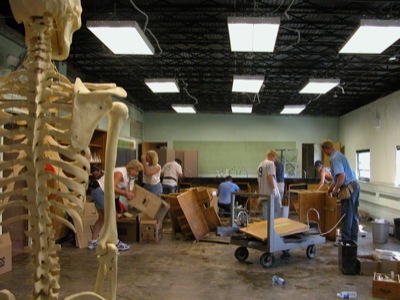Thursday, August 30th, 2007
Fort Recovery farmer will power homes with manure
By William Kincaid
A Fort Recovery poultry farmer soon will be harvesting 1.8 megawatts of electricity - enough to power 300 area homes.
Jim Wenning, owner of Wenning Poultry, has installed a new methane digester on his farm that will convert poultry manure to electricity that will be sold to Midwest Electric.
The project, which should be operational by December, will be the first of its kind in Ohio and one of the first in the nation, said Matt Berry, customer service manager at Midwest, a co-op based out of St. Marys.
"It's something we want to see more of," Berry said, adding this first project will provide electricity to all of Midwest's customers in Sharpsburg and some outside of Fort Recovery.
When completed, the digester system will convert the poultry manure into two bi-products: bio-gas, which will be burned to create electricity, and bio-solid, which will be used as bedding or fertilizer.
Berry said Wenning initially approached Midwest Electric about the idea of selling energy derived from the burning of bio-fuel.
"He actually approached us ... which is really the way it has to work," Berry said.
Midwest officials then spent the next few years working out the many details involved with the project, including means of distribution, transmission systems, regional oversight and a system impact study. They also came to a rate agreement with Wenning for his electricity.
Wenning is responsible for financing the project, which he estimates to be around $3 million. He did obtain a $500,000 grant from the U.S. Department of Agriculture, which he said will cover about 20 to 25 percent of the cost of the digester system.
Currently, excavation has been completed where the digester system and generators will be located when the project begins operation in December.
"Probably one guy should be able to man the operation on a daily basis," Wenning said.
Wenning called the system a good "value-added benefit" to the farm.
"It will give us more avenues and markets for the manure, such as providing cleaner compost for organic farming," he said.
Wenning also said the bio-solid, when used as fertilizer, will help add carbon to the soil.
"The U.S. is depleting its carbon sources in soil, and this end product will add carbon to the soil for those who use this manure," he said. "Commercial fertilizers are salt-based and in time will deplete the soils. Our product will rebuild that soil. This will be a good niche - something they can't find anywhere else."
Berry believes such systems could play a role in improving the water quality of Grand Lake, as the manure will be converted to usable byproducts, instead of being applied on the land.
Also, Berry believes that southern Mercer County is well poised for additional digester systems because of the many farmers there. As national legislators continue to push for and may eventually mandate additional alternative energy resources, digester systems may be one of the answers, he said.
Such systems also provide Midwest - which serves more than 10,500 members in seven counties in western Ohio - additional energy capacity, which Berry said is necessary nowadays. Because of increasing regulations and specifications, Berry said it is more difficult to build additional power plants.
"The capacity is not growing at the same rate as demand," Berry said, before adding that such a problem is ongoing nationwide, not just in Western Ohio.

